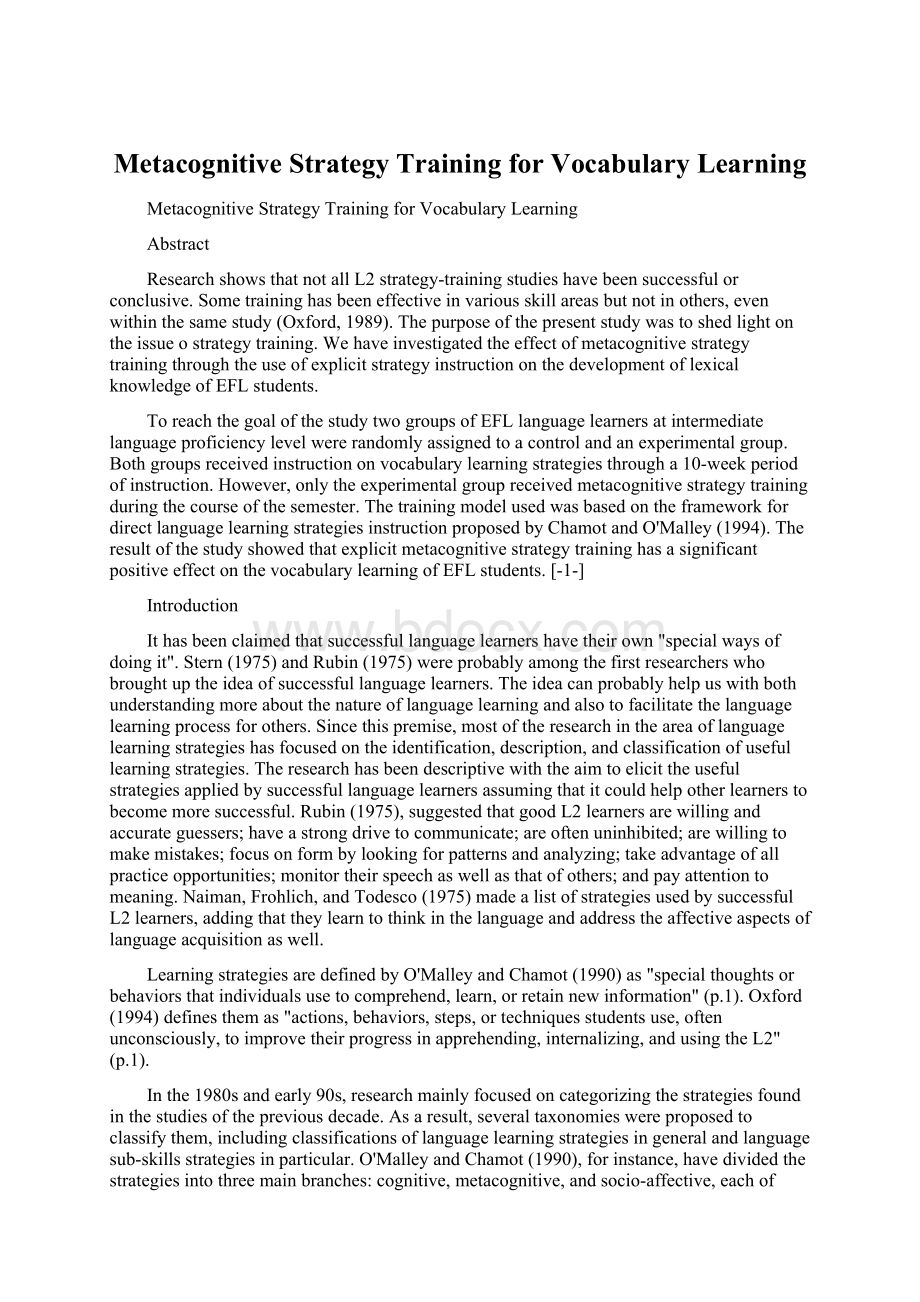Metacognitive Strategy Training for Vocabulary LearningWord文档格式.docx
《Metacognitive Strategy Training for Vocabulary LearningWord文档格式.docx》由会员分享,可在线阅读,更多相关《Metacognitive Strategy Training for Vocabulary LearningWord文档格式.docx(15页珍藏版)》请在冰豆网上搜索。

Introduction
Ithasbeenclaimedthatsuccessfullanguagelearnershavetheirown"
specialwaysofdoingit"
.Stern(1975)andRubin(1975)wereprobablyamongthefirstresearcherswhobroughtuptheideaofsuccessfullanguagelearners.Theideacanprobablyhelpuswithbothunderstandingmoreaboutthenatureoflanguagelearningandalsotofacilitatethelanguagelearningprocessforothers.Sincethispremise,mostoftheresearchintheareaoflanguagelearningstrategieshasfocusedontheidentification,description,andclassificationofusefullearningstrategies.Theresearchhasbeendescriptivewiththeaimtoelicittheusefulstrategiesappliedbysuccessfullanguagelearnersassumingthatitcouldhelpotherlearnerstobecomemoresuccessful.Rubin(1975),suggestedthatgoodL2learnersarewillingandaccurateguessers;
haveastrongdrivetocommunicate;
areoftenuninhibited;
arewillingtomakemistakes;
focusonformbylookingforpatternsandanalyzing;
takeadvantageofallpracticeopportunities;
monitortheirspeechaswellasthatofothers;
andpayattentiontomeaning.Naiman,Frohlich,andTodesco(1975)madealistofstrategiesusedbysuccessfulL2learners,addingthattheylearntothinkinthelanguageandaddresstheaffectiveaspectsoflanguageacquisitionaswell.
LearningstrategiesaredefinedbyO'
MalleyandChamot(1990)as"
specialthoughtsorbehaviorsthatindividualsusetocomprehend,learn,orretainnewinformation"
(p.1).Oxford(1994)definesthemas"
actions,behaviors,steps,ortechniquesstudentsuse,oftenunconsciously,toimprovetheirprogressinapprehending,internalizing,andusingtheL2"
(p.1).
Inthe1980sandearly90s,researchmainlyfocusedoncategorizingthestrategiesfoundinthestudiesofthepreviousdecade.Asaresult,severaltaxonomieswereproposedtoclassifythem,includingclassificationsoflanguagelearningstrategiesingeneralandlanguagesub-skillsstrategiesinparticular.O'
MalleyandChamot(1990),forinstance,havedividedthestrategiesintothreemainbranches:
cognitive,metacognitive,andsocio-affective,eachofwhichincludeslotsofsub-strategiessuchasrehearsal,organization,summarizing,deducing,andimagery.Ontheotherhand,Oxford(1990a)hasproposedamorecomprehensivemodelinwhichsixcategories,classifiedintotwogroupsofdirectandindirectexist.Thedirectstrategiesincludememory,cognitive,andcompensationwhileindirectstrategiesincludemetacognitive,affective,andsocial.
AsOxford(1990b)mentions,thesocialandaffectivestrategiesarefoundlessofteninL2research.Thisis,perhaps,becausethesebehaviorsarenotstudiedfrequentlybyL2researchers,andbecauselearnersarenotfamiliarwithpayingattentiontotheirownfeelingsandsocialrelationshipsaspartoftheL2learningprocess.
AccordingtoO'
MalleyandChamot(1990),cognitive(e.g.,translating,analyzing)andmetacognitive(e.g.,planning,organizing)strategiesareoftenusedtogether,supportingeachother.Theassumptionisthatusingacombinationofstrategiesoftenhasmoreimpactthansinglestrategies.AsGraham(1997,pp.42-43)states,thedistinctionsbetweencognitiveandmetacognitivestrategiesareimportant,partlybecausetheyhelpustoindicatewhichstrategiesarethemostimportantindeterminingtheeffectivenessoflearning.Grahambelievesthatmetacognitivestrategies,thatallowstudentstoplan,control,andevaluatetheirlearning,havethemostcentralroletoplayinimprovementoflearning.Anderson(2002b)believesthat"
Developingmetacognitiveawarenessmayalsoleadtothedevelopmentofstrongercognitiveskills"
(p.1).Sincemetacognitivestrategiesarethefocusofthisstudy,amoredetaileddiscussiononthistopicfollows.[-2-]
Metacognition
Metacognitioninvolves"
activemonitoringandconsequentregulationandorchestrationofcognitiveprocesstoachievecognitivegoals"
(Flavell,1976,p.252).FlavellandWellman(1977),andFlavell(1979)includedinterpretationofongoingexperience,orsimplymakingjudgmentsaboutwhatoneknowsordoesnotknowtoaccomplishatask,asotherfeaturesofmetacognition.Alongwiththenotionsofactiveandconsciousmonitoring,regulation,andorchestrationofthoughtprocess,Flavellbelievedthroughrepeateduseofmetacognition,itmightintimebecomeautomatized.
Anderson(2002a,p.1)definesmetacognitionas"
thinkingaboutthinking."
AsAndersonstates,theuseofmetacognitivestrategiesignitesone'
sthinkingandcanleadtohigherlearningandbetterperformance.Furthermore,understandingandcontrollingcognitiveprocessmaybeoneofthemostessentialskillsthatteacherscanhelpsecondlanguagelearnersdevelop.
Mostoftheearlyinvestigationsofmetacognitionweredescriptiveinnatureinthattheysoughttodescribegeneraldevelopmentalpatternsofchildren'
sknowledgeaboutmemoryprocesses.Theywereparticularlyinterestedinprocessesconcernedwithconsciousanddeliberatestorageandretrievalofinformation.However,asstudiesmovedfromdescriptivetoempirical,thekindsofmethodologyexpanded,thenumberofstudiesincreased,andtheneedforaschemetoclassifythisgrowingcorpusofliteratureonmetacognitionarose.Severalclassificationschemeshavebeenusedtogroup,analyze,andevaluatethesestrategies(e.g.,Flavel,1976;
1979;
Flavell&
Wellman,1977;
Kluwe,1982)andeventhoughthereareimportantdifferencesamongthem,overall,threegeneralcategoriesconsistentlyappear:
cognitivemonitoring,cognitiveregulation,andacombinationofboth.
Anderson(2002a),basedonpreviousresearch,hasproposedfivemaincomponentsformetacognition.Theyinclude:
1)preparingandplanningforlearning,2)selectingandusinglearningstrategies,3)monitoringstrategyuse,4)orchestratingvariousstrategies,and5)evaluatingstrategyuseandlearning.
Bypreparationandplanninginrelationtotheirlearninggoal,studentsthinkaboutwhattheirgoalsareandhowtheywillgoaboutaccomplishingthem.Students,withthehelpoftheteacher,cansetarealisticgoalwithinasettimeforaccomplishingthatgoal.Settingclear,challenging,andrealisticgoalscanhelpstudentsseetheirownprogressandhopefully,bybecomingconsciouslyawareoftheirprogress,thestudents'
motivationforlearningwouldbeincreased.
Themetacognitiveabilitytoselectanduseparticularstrategiesinagivencontextforaspecificpurposemeansthatthelearnercanthinkandmakeconsciousdecisionsaboutthelearningprocess.Learnersshouldbetaughtnotonlyaboutlearningstrategiesbutalsoaboutwhentousethemandhowtousethem.Studentsshouldbeinstructedonhowtochoosethebestandmostappropriatestrategyinagivensituation.
Thenextmaincomponentofmetacognitionismonitoringstrategyuse.Byexaminingandmonitoringtheiruseoflearningstrategies,studentshavemorechancesofsuccessinmeetingtheirlearninggoals(Anderson,2002a).Studentsshouldbeexplicitlytaughtthatoncetheyhaveselectedandbeguntousethespecificstrategies,theyneedtocheckperiodicallywhetherornotthosestrategiesareeffectiveandbeingusedasintended.Forexample,whenreading,theycanusecontexttoguessthemeaningofsomeunknownvocabularyitems.Tomonitortheiruseofthisstrategy,theyshouldpauseandchecktoseeifthemeaningtheyguessedmakessenseinthetextandifnot,gobackandmodifyorchangetheirstrategy.[-3-]
Knowinghowtouseacombinationofstrategiesinanorchestratedfashionisanimportantmetacognitiveskill.Researchhasshownthatsuccessfullanguagelearnerstendtoselectstrategiesthatworkwelltogetherinahighlyorchestratedway,tailoredtotherequirementsofthelanguagetask(Chamot&
Kupper,1989;
Wenden,1998).Theselearnerscaneasilyexplainthestrategiestheyuseandwhytheyemploythem(O'
Malley&
Chamot,1990).
BasedonChamotandKupper(1989),certainstrategiesorclustersofstrategiesarelinkedtoparticularlanguageskillsortasks.Forexample,L2writing,likeL1writing,benefitsfromthelearningstrategiesofplanning,self-monitoring,deduction,andsubstitution.L2speakingdemandsstrategiessuchasrisk-taking,paraphrasing,circumlocution,self-monitoring,andself-evaluation.L2listeningcomprehensiongainsfromstrategiesofelaboration,inferencing,selectiveattention,andself-monitoring.Readingcomprehensionusesstrategieslikereadingaloud,guessing,deduction,andsummarizing.Researchshowsth